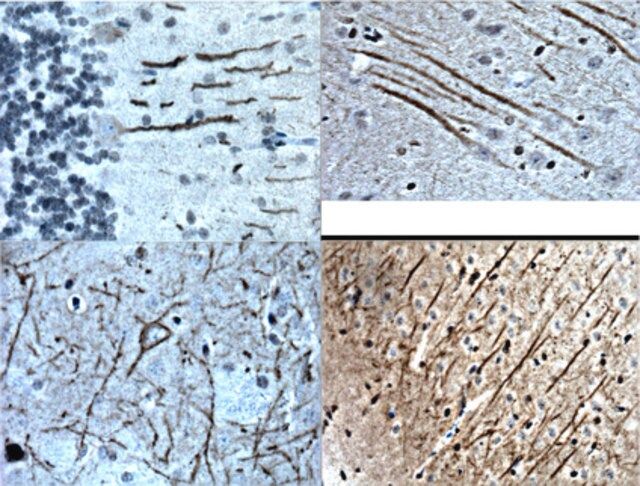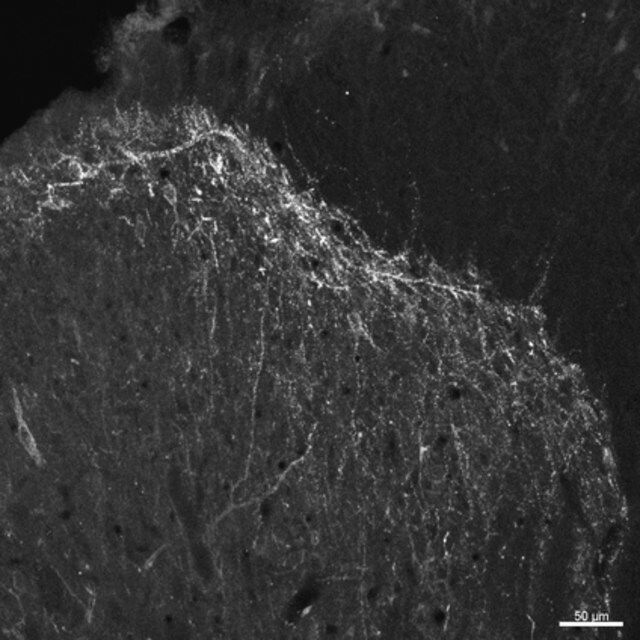您的位置:首页 > 产品中心 > Anti-Substance P Receptor Antibody
Anti-Substance P Receptor Antibody

产品别名
Anti-Substance P Receptor Antibody
Substance-P receptor, Neurokinin-1 receptor, NK-1 receptor, NK-1R, SPR, Tachykinin receptor 1
基本信息
| eCl@ss | 32160702 |
| NACRES | NA.41 |
| General description【一般描述】 | Substance-P receptor (UniProt P14600; also known as Neurokinin-1 receptor, NK-1 receptor, NK-1R, SPR, Tachykinin receptor 1) is encoded by the Tacr1 (also known as Nk1r, Tac1r) gene (Gene ID 24807) in rat species. NK-1, NK-2 and NK-3 are receptors that mediate the biological activities of tachykinins, including substance P (SP), neurokinin A (NKA), neurokinin B (NKB), ranakinin, kassinin, neuropeptide gamma, and eledoisin, widely distributed in the central and peripheral nervous systems. SP shows the highest affinity toward NK-1R (substance-P receptor) and exerts its biological activities via NK-1R, including addition, depression, chronic inflammation, and cancer progression. The involvement of NK-1R in acute pancreatitis through mediating neurogenic inflammation has also been reported. Upon stimulation by SP, the NK-1R interacts with multiple G proteins, including Gαs, Gαq/11, Gαi/o, Gα12, and Gα13, generating second messengers and activating downstream effector molecules. After binding NK-1R, SP induces a clathrin-dependent internalization of the receptor-ligand complex, SP is then degraded and the receptor is recycled to the cell surface. NK-1R is a 7-transmembrane (32-54, 65-86, 107-128, 149-169, 195-219, 249-270, 284-308) GPCR, having its N-terminal end (a.a. 1-31) at the extracelluar side and C-terminal end (a.a. 309-407) at the cytoplasmic side. There exist a second alternatively spliced human NK-1R isoform that lacks the C-terminal cytoplasmic domain (a.a. 312-407 missing). The full-length form enhances the growth of cancer cells and stimulates the production of cytokines, which up-regulate the truncated form. The truncated form mediates malignancy and is more abundant in colonic epithelial cells from patients with colitis-associated cancer. In cancer cells, the NK-1 receptor is mainly localized on the plasma membrane and in cytoplasm, and occasionally also in the nucleus. |
| Specificity【特异性】 | This guinea pig polyclonal antiserum targets substance P receptor C-terminal end sequence. Target region is absent in human spliced isoform 2. |
| Immunogen【免疫原】 | KLH-conjugated linear peptide corresponding to the C-terminal end sequence of rat substance P receptor. Epitope: C-Terminus |
| Application【应用】 | Research Sub Category Synapse & Synaptic Biology Western Blotting Analysis: A 1:1,000 dilution from a representative lot detected substance P receptor in 10 µg of human brain tissue lysate. Immunohistochemistry Analysis: A 1:500 dilution from a representative lot detected substance P receptor in rat brain tissue sections. Immunofluorescence Analysis: A 1:5,000-10,000 dilution from a representative lot detected substance-P receptor in frozen rat spinal cord tissue sections (25 µm cryostat) fixed with 4% paraformaldehyde containing 0.18% picric acid by indirect immunofluorescence staining using a rhodamine Red-X-conjugated secondary antibody. Immunofluorescence Analysis: A representative lot detected substance-P receptor- (NK-1R) positive neurons by fluorescent immunohistochemistry staining of 4% paraformaldehyde-fixed and 0.2% Triton X-100-permeabilized mouse brain cryosections (Manzke, T., et la. (2010). J. Clin. Invest. 120(11):4118-4128). Immunocytochemistry Analysis: A representative lot detected substance-P receptor (NK-1R) by fluorescent immunocytochemistry staining of cultured primary E17-E18 rat embryonic amygdala neurons fixed with 4% paraformaldehyde and permeabilized with 0.1% saponin (Yu, Y.J., et al. (2009). J. Neurosci. 29(1):222-233). Research Category Neuroscience This Guinea pig polyclonal Anti-Substance P Receptor Antibody, Cat. No. AB15810 detects levels of Substance P receptor, and has been published and validated for use in Immunocytochemistry, Immunofluorescence, Immunohistochemistry, and Western Blotting. |
| Quality【质量】 | Evaluated by Western Blotting in rat brain tissue lysate. Western Blotting Analysis: A 1:5000 dilution from a representative lot detected substance-P receptor in 10 µg of rat brain tissue lysate. |
| Physical form【外形】 | Unpurified. Format: Unpurified Guinea Pig polyclonal antibody serum with 0.05% sodium azide |
| Analysis Note【分析说明】 | Control Rat brain tissue lysate |
| Legal Information【法律信息】 | CHEMICON is a registered trademark of Merck KGaA, Darmstadt, Germany |
产品性质
| Quality Level【质量水平】 | 100 |
| biological source【生物来源】 | guinea pig |
| antibody form【抗体形式】 | unpurified |
| antibody product type | primary antibodies |
| clone【克隆】 | polyclonal |
| species reactivity | human, rat, mouse |
| manufacturer/tradename | Chemicon® |
| technique(s) | immunocytochemistry: suitable immunofluorescence: suitable immunohistochemistry: suitable western blot: suitable |
| NCBI accession no.【NCBI登记号】 | NP_036799 |
| UniProt accession no.【UniProt登记号】 | P14600 |
| shipped in【运输】 | wet ice |
产品说明
| Target description【目标描述】 | ~58/54 kDa observed. Target band size appears larger than the calculated molecular weights of 46.25/46.32/46.37 kDa (human/mouse/rat) due to glycosylation. Uncharacterized bands may be observed in some lysate(s). |
| Storage and Stability【储存及稳定性】 | Stable for 1 year at -20°C from date of receipt. Handling Recommendations: Upon receipt and prior to removing the cap, centrifuge the vial and gently mix the solution. Aliquot into microcentrifuge tubes and store at -20°C. Avoid repeated freeze/thaw cycles, which may damage IgG and affect product performance. |
| Disclaimer【免责声明】 | Unless otherwise stated in our catalog or other company documentation accompanying the product(s), our products are intended for research use only and are not to be used for any other purpose, which includes but is not limited to, unauthorized commercial uses, in vitro diagnostic uses, ex vivo or in vivo therapeutic uses or any type of consumption or application to humans or animals. |
安全信息
| Storage Class Code【储存分类代码】 | 12 - Non Combustible Liquids |
| WGK | WGK 1 |







